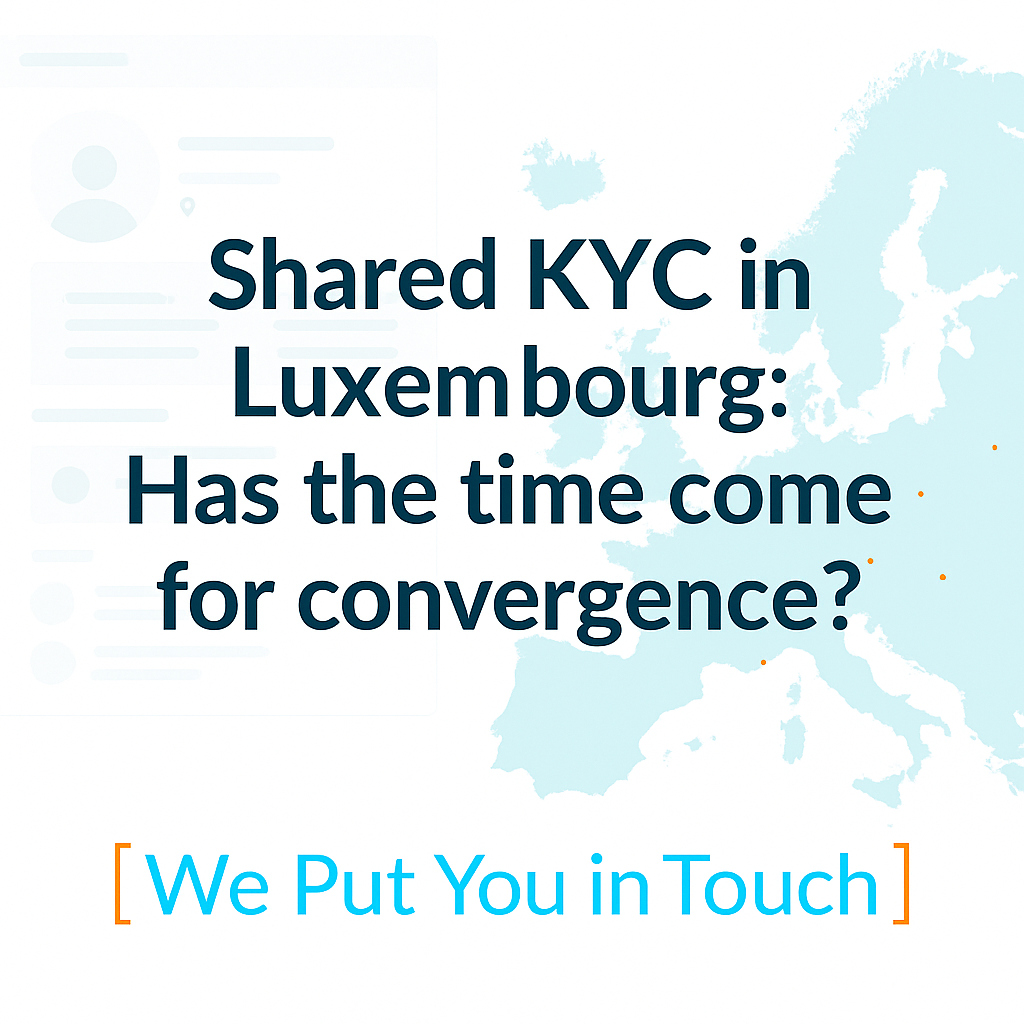
The Inefficiency We All Know
Know Your Customer (KYC) procedures remain one of the most redundant and resource-heavy aspects of compliance in Luxembourg’s financial sector. Despite advances in onboarding technology, each institution continues to collect, verify, screen and store essentially the same information—over and over again. In a highly interconnected financial centre like Luxembourg, this duplication translates into unnecessary delays, higher costs, and a less-than-seamless client experience.
Shared KYC—where onboarding data and due diligence outcomes can be reused across multiple institutions under a controlled, consent-based framework—has long promised relief. But has the concept truly moved beyond the pilot phase?
A Dynamic but Fragmented Landscape
Over the past three years, several shared KYC initiatives have taken shape in Luxembourg, such as:
- i-Hub, a support PSF created by POST Luxembourg and BGL BNP Paribas, provides a centralised KYC repository used by multiple institutions. It combines identity verification, screening, and continuous monitoring under a shared service model (i-hub.com).
- FundsDLT, a blockchain-based infrastructure backed by Fundsquare, InTech, and KPMG, integrates KYC into investor onboarding workflows. The platform uses smart contracts and digital identities to streamline data portability across asset managers and transfer agents (fundsdlt.net).
- The ABBL–SnT proof-of-concept, launched in partnership with the University of Luxembourg, tested distributed ledger technology (DLT) for interbank KYC sharing. It demonstrated potential for cost savings and auditability, but also raised complex questions about liability and data ownership (finextra.com).
Alongside these more visible platforms, several large banking groups are experimenting with internal data pooling or shared onboarding frameworks within their networks. The appetite for mutualisation is real—but the path to market-wide adoption remains unclear.
Five Barriers to Generalisation
While technology is no longer the limiting factor, shared KYC faces deeper structural challenges:
- Lack of liability frameworks
Institutions remain hesitant to rely on external checks without a clear allocation of responsibility if data proves inaccurate or outdated. - Inconsistent governance standards
Questions persist around how responsibilities are divided, what constitutes “sufficient” verification, and how controls are supervised across participants. - Fragmented initiatives
Most existing projects operate in isolation—either bilaterally or within private ecosystems—limiting scalability and interoperability. - Regulatory uncertainty
The CSSF has yet to provide a harmonised framework or endorsement for shared KYC models. As a result, some institutions perceive innovation in this area as legally risky. - Trust gaps
Without a neutral orchestrator, many actors are reluctant to rely on the onboarding work of peers or competitors, even with robust audit mechanisms.
What Would Unlock Progress?
To move forward, the Luxembourg financial community needs more than technical platforms—it needs structural alignment. This could take the form of:
- Regulatory guidance, defining acceptable models of mutualisation and auditability;
- Standardisation, both in terms of data formats and minimum verification thresholds;
- Governance models, outlining roles, responsibilities, and escalation mechanisms;
- Cost-sharing frameworks, which could incentivise participation through proportional benefits.
In parallel, institutions must rethink how they structure their own onboarding value chains. This includes engaging multidisciplinary teams—from compliance and legal to IT architecture—to ensure readiness for interoperable onboarding.
Building the Right Capability
For many institutions, the key question is not whether shared KYC makes sense, but whether they have the internal bandwidth and expertise to implement it.
That’s where external support becomes essential. Whether through temporary programme management, legal structuring of data-sharing agreements, or API integration design, access to focused talent is often what separates ambition from execution. This is one of the reasons why we’ve seen a growing demand for flexible, mission-driven experts—something We Put You in Touch supports via its network of consultants across compliance, operations, and digital transformation. Learn more here.
Conclusion
Shared KYC has matured—technologically and conceptually. But Luxembourg’s next challenge is coordination. Fragmented innovation must now give way to convergence around governance, trust, and value creation. Institutions that act early—by aligning processes, testing partnerships, and engaging specialised support—will be better positioned to benefit from the efficiencies and reputational advantages this transformation offers.
If Luxembourg succeeds in bridging the remaining gaps, it could well become the benchmark for compliant, cross-institutional onboarding in Europe.
References
- i-Hub – Centralised onboarding & regulatory model
- FundsDLT – Registrar and KYC brochure
- ABBL–SnT KYC PoC (DLT-based) – Press release
- LHoFT on KYC innovation – LinkedIn post
